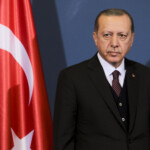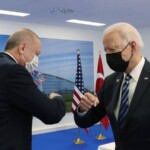Accessible free of charge on the public service’s new online platform, the series ostensibly recounts the adventures of a young idealist and anti-racist activist-turned-capitalist and conspirator after inheriting his father’s fortune. The star of the story is named Teoman Bayramli. But no one in Turkey was fooled. The lead actor’s physique, coarse hair, beard and blue eyes are easily taken for those of patron of the arts and businessman Osman Kavala, who has been behind bars since 2017.
“The height of impudence.” A few words is sometimes all it takes to capture the spirit of the moment. These were written by director and actor Mahir Günsiray, known for his independence and his mastery of his craft.
His father Orhan was a star of Turkish cinema who himself had to contend with the vicissitudes of public theater and censorship for years. Günsiray used a simple tweet to express all the anger and disgust that has surrounded the release of the first episode of a series entitled Metamorfoz (“Metamorphosis”), produced and broadcast by the state TV channel TRT.
Accessible free of charge on the public service’s new online platform, the series ostensibly recounts the adventures of a young idealist and anti-racist activist-turned-capitalist and conspirator after inheriting his father’s fortune.
The star of the story is named Teoman Bayramli. But no one in Turkey was fooled. The lead actor’s physique, coarse hair, beard and blue eyes are easily taken for those of patron of the arts and businessman Osman Kavala, who has been behind bars since 2017. The gimmick is a heavy-handed way of portraying Kavala as guilty of the misdemeanors and crimes of which the authorities in Ankara have accused him.
In real life, the philanthropist was sentenced in 2022, after four and a half years in pre-trial detention, to life without possibility of parole. The verdict, which was handed down after less than an hour’s deliberation, saw seven other defendants each receive 18-year sentences: architect Mücella Yapici, documentary filmmaker Çigdem Mater, civil rights activist Ali Hakan Altinay, lawyer Can Atalay, filmmaker Mine Özerden, academic Tayfun Kahraman and NGO founder Yigit Ali Ekmekçi. All were found guilty of attempting to “overthrow the government” by inciting the protests in Gezi Park, Istanbul, in the spring of 2013.
The movement was the first major outburst of protest against President Recep Tayyip Erdogan, then serving as prime minister. Peaceful and spontaneous, driven mainly by young people, it was violently put down at the cost of eight lives. At the time, Kavala, known for devoting his fortune to charitable activities and promoting Turkey’s multicultural heritage – Kurdish, Armenian and Syriac – had tried to mediate between the demonstrators and the authorities. It didn’t turn out well. He has since become Turkish officials’ primary target. Indeed, Turkey’s leader has made no secret of his desire to punish the arts patron.
Barely a week after Kavala’s arrest, and even though no charges had yet been brought against him, the head of state told his party’s activists: “Some people are trying to distort the truth by presenting him as a good citizen. But the identity of this character, nicknamed ‘the Soros of Turkey,’ has been unmasked.”
Erdoğan was referring to American billionaire philanthropist George Soros, who has become one of the most reviled figures among the global far right and many of the world’s authoritarian leaders.
It took two years for prosecutors to draw up a somewhat sloppy indictment. From it, the public learned that Kavala’s plane tickets were considered to be incriminating evidence; that he was a foreign agent because he traveled in 2012 “with representatives of Open Society,” [George Soros’ NGO]; and that anonymous witnesses vouched for his involvement in the Gezi uprising, which was described as being hatched from abroad.
He has denied the accusations and decried a “legal assassination” based on “conspiracy theories.” Trial observers have enlivened their comments with allusions to Kafka – not The Metamorphosis, but The Trial and The Castle.
In February 2020, the criminal court acquitted all of the trial’s defendants, pointing out that the prosecutor’s case had not been backed up by any concrete evidence. Nonetheless, just as the bus was about to go through the gates of the prison, Kavala was arrested on the order of the Istanbul prosecutor, this time with two new charges formulated especially for the occasion: “Political and military” espionage and participation in July 2016’s failed coup attempt.
Kavala’s release has been demanded for over three years by the European Court of Human Rights (ECHR), which has been threatening Ankara with infringement proceedings. All for nothing. Speaking from prison, the businessman explained at one of his hearings that the sole purpose of his detention was to enable Erdogan’s government “to maintain the fiction of a conspiracy.”
Finally, in a most dramatic fashion, the story moved to television. The tone was set within the first minutes of the Metamorfoz series, one of darkness and intrigue. The character Bayramlı walks through a cascade of burning newspapers with spectacular headlines: “F-16 aircraft in Bayramli electronic warfare,” “Bayramli hotel to wipe out sea turtles,” “Heir creates bank,” “Teoman Bayramli chose Swedish rather than Turkish telephones.”
It’s all there: greed, the taint of profit, foreign suspicion, and treachery. As the headlines burn he appears from behind as if erasing his own affairs with one stroke. He opens a door and before him there is a car wreck, fire and youths throwing Molotov cocktails.
The rest of the series follows in a similar vein. It is a parody of a biopic set against a backdrop of implausible plots. At one point, one of Bayramli’s relatives even takes the trouble to note that he was born in Paris and studied in Istanbul at Robert College—just like Kavala. The young woman then places a revolutionary’s hat on his head, smiles and calls him “Turkey’s Che Guevara.” Kavala, for his part, has long been known as “the red billionaire.”
From his cell, the former patron of the arts has written a steely, remarkably restrained text: “I’ve learned that the public broadcaster TRT has commissioned and financed a script about me, which is being broadcast as a TV series. To evade the laws protecting the integrity of the individual, they employed the subterfuge of not explicitly using my name. Just as those who unfairly sentenced me to prison were, it is clear that this series was inspired by tactics that distort reality and that it seeks, through conspiracy theories, to feed the notion of my guilt.”
And then this: “I’m not surprised that public resources are being invested in such goals. What surprises and saddens me is that young actors feel no shame in taking part in this project aimed at ‘character assassination,’ and which seeks to discredit me.”
A discreet way of reminding us of the power of deception and the madness it unleashes.
This article was originally published in French by Le Monde. It has been translated by FTP.
The views and opinions expressed above are the author’s and do not represent those of the Free Turkish Press.


